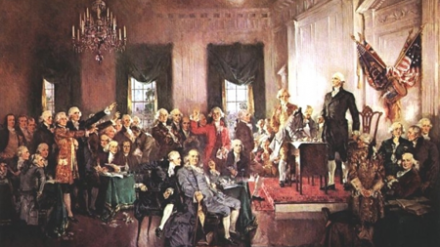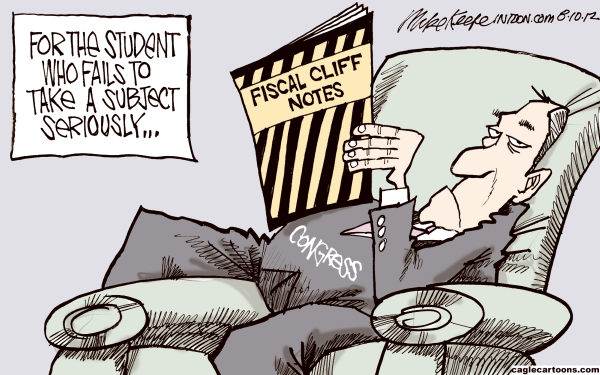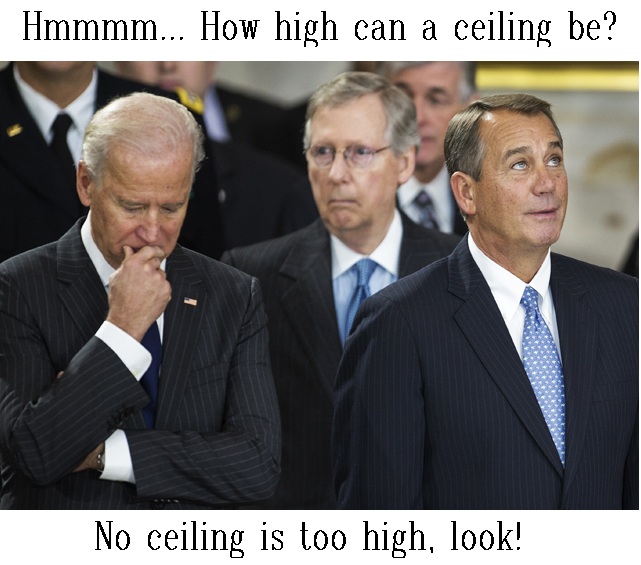By Josh Loveless – Candidate for U.S. Congress 2014
The close examination of nearly every document written by the founders of our great nation reveals a persuasive common refrain: That all men are created equal, and that despotism occurs when one person or group seeks to prop themselves up above the others. It’s not just a phrase from the Declaration of Independence but rather a thematic supposition for the discourse of that age.
It is for this reason that our United States Constitution was written in the manner that it was. It is in part also the cause of its genius. The entire document, including the Bill of Rights, is a lesson in balance; a balance designed to protect equality. Every phrase and every Article is intended to create a system of compromises, or as it’s often referred to, checks and balances. Each power ceded to one person or group is checked by another.
The power of the federal government is balanced with the states, and all the states with the voice of the people. The three branches of the federal government balance and check each other; three making it impossible to tip the scales. This system of checks and balances is well known and largely understood by most Americans. But what we often forget is the historical context by which they came about.
In the great Constitutional Convention of 1787 the delegates of the various states met together with the original intention of refining the existing governing document of the day, the Articles of Confederation. However, some delegates came with the unwavering intention of replacing the Articles with a new government. This was the beginning of many extraordinarily lengthy and furious debates.
It took an entire hot Philadelphia summer, from May to September, for the delegates to write and agree up on the Constitution. The disagreements were hotter than the summer air, in so much so that the Constitution can really be called a document of compromises. Nearly every governing rule contained in it is the result of some compromise; from the number of Senators, the splitting of the Congress into two houses, the powers of the President, the number of Supreme Court justices, and the election of the President through an Electoral College.
It is these compromises that in and of themselves create the checks and balances of the system. Without compromise the Articles would have been unbalanced and the Constitution would have failed miserably. 226 years later the principles of compromise and protection of equality appear to be largely forgotten. The lessons taught to us by our fore-fathers are essentially being ignored.
There are many examples of this irresponsible amnesia in our recent political discourse. For example on Monday, January, 14 2013 President Obama complained, “America cannot afford another debate with this Congress about whether or not they should pay the bills they’ve already racked up”. Less recently in response to a request by Republicans to discuss the 2009 stimulus bill, the President refused to listen to Republicans or debate the merits of the bill, simply stating, “I won”.
Not to be outdone by the uncompromising president, House Speaker John Boehner has also given up on debate. During a particularly difficult negotiation over the recent Fiscal Cliff bill Boehner offered the President an increase in taxes and then asked, “What am I getting?” The president replied, “You don’t get anything for it. I’m taking that anyway.” After this exchange Boehner was quoted as saying he was “done meeting with President Obama one-on-one”, and that he would no longer participate in debate with the White House.
It is this exact lack of genuine discussion and compromise that has created many of the problems our nation faces today. There is nothing wrong at all with having strong principles and standing on those principles. But there is something terribly wrong in thinking that we, or our leaders, or our political parties, or our principles are the only right ones. We are wrong to believe in the superiority of our ideas to exclusion of all others, such that we refuse to even listen to those who disagree.
Many of my conservative friends will probably vehemently disagree with that statement. But if you do, I submit that it is a grave mistake. They would perhaps argue that our situation has occurred BECAUSE we have compromised on our principles. I disagree. I would submit that in those cases, we haven’t compromised, but instead have surrendered these principles back and forth as often as we’ve changed our politicians. I would submit that we have forgotten what compromise in context of the United States government certainly means.
The Constitution proves this point emphatically in my opinion. From a Constitutional perspective compromise should not mean a surrender of one idea or principle to another. Instead compromise can be a policy, a law, or an article that allows two seemingly conflicting principles to peacefully co-exist, to even work together for the common good. It is that type of compromise that creates balance. It is that type of balance that is endangered.
Yes, there are some principles upon which we CANNOT compromise, and that we can accept no form of balancing power. I would submit however that most of those issues are already settled. Examples would be the need for a strong Federal government that does not allow states to secede. Or, that every American is free, and equal, despite race, religion, or creed. While not perfect, the major flaws in the Constitution have been addressed.
Instead, here are a few examples of principles we are choosing not to compromise on, in favor of angry, divisive, and often dishonest pretension:
Liberals traditionally believe in a strong government that constrains business, protects common citizens, and cares for our environment. They are traditionally a party focused on compassion. You may not agree with their conclusions about Global Warming for example, but can you in good conscience look out the window at smoggy skies, and filthy water and say we cannot do better? We live in a time of great economic instability and wide-spread joblessness. Is this not a time in which our government should find reasonable ways to have and encourage compassion?
Conservatives generally believe in limited government, constrained spending, and a powerful military. In this age of runaway spending can our liberal friends not agree that more limits and constraints on government might be needed? In an age of increasing global instability can we really argue against a strong centralized military? Can conservatives not agree that a strong military isn’t necessarily an expensive one, and that military constraint can be equally powerful if properly implemented?
This is only scratching the surface of course. For most issues currently facing the American people, the answer is yes, there is room for compromise. In fact, I would submit that most Americans are still very much in the center on the big issues. We are generally reasonable people. Many of us are actually seeking for this kind of debate, for leaders who are willing to strike bargains that are universally beneficial. We want to have a good and a reasonable public discourse of ideas.
But our political class, our media, and many or our own personal conversations have abandoned this standard, and in some cases have abandoned all reason. George Washington in his Farewell Address prophetically warned our nation about party affiliations and the dangers of extremism and polarization.
“The name of American, which belongs to you in your national capacity, must always exalt the just pride of patriotism more than any appellation derived from local discriminations. With slight shades of difference, you have the same religion, manners, habits, and political principles. You have in a common cause fought and triumphed together; the independence and liberty you possess are the work of joint counsels, and joint efforts of common dangers, sufferings, and successes.
But these considerations, however powerfully they address themselves to your sensibility, are greatly outweighed by those which apply more immediately to your interest. Here every portion of our country finds the most commanding motives for carefully guarding and preserving the union of the whole.”
It is this thought that should normalize our discourse, the thought that we protect individual liberty best by acting in concert. Together, we have largely ignored this original American theme. We have instead placed tremendous burdens (in the form of dishonest, rhetorical, “platitudinized”, angry discourse) on the platforms of the scale of American government. In its inspired greatness this Constitutional scale is right now holding up under the tension. But the chains that secure the scale’s platforms are straining and may soon burst.
Make no mistake; a break in this scale would have far reaching negative consequences. We must soon remember who we are, and what we really stand for or risk the fall of our union. We need to personally change the way we speak to each other and the way we debate.
And if we as a people place our leaders and our media instead upon the scales and find that they do not balance. If we find that they are unwilling to hold civil discourse on difficult topics. Or if we find them so unbending as to reject sound compromise, then it is our duty as Americans to replace them. That is our check and our balance against them.
To learn more about Josh Loveless and his campaign for U.S. House of Representatives visit:
www.facebook.com/joshlovelessforcongress








